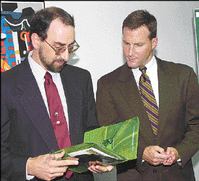
Mark Nolan, (left), Chief of Party of the United States Agency for International Development's Ridge to Reef Watershed Management Project, peruses a document on biodiversity at yesterday's Earth Day observance at the United States Embassy's Office of Public Affairs in Kingston. Looking on is Michael Koplovsky of the US Embassy. - Norman GrindleyAN ARTIST'S rendition of a dragonfly, surrounded by birds, flowers, animals and marine life, adorns the poster for Earth Day 2001, the 31st official observance of the need to preserve the natural environment.
But, while environmentalists keep plugging the message of sustainable development, Jamaica continues to wage an uphill battle against deforestation, water and air pollution and improper solid waste disposal.
"The combined effect of these issues is that they threaten livelihoods, water resources and ultimately, the economy...they pose a serious threat to the tourist industry," says Mark Nolan, Chief of Party of the US$8 million Ridge to Reef Watershed Project, which is funded by the United States Agency for International Development, USAID.
Mr. Nolan gave the main address at yesterday's Earth Day observance at the American Embassy's Office of Public Affairs in New Kingston.
The Watershed Project Manager observed that yam farming and the felling of trees for lumber and charcoal caused a loss of forest cover, which in turn led to soil erosion, siltation of rivers and the degradation of coastal areas.
Scandal-bag toilets
Water was being rendered unfit for human consumption, he said, due to pollution from raw sewage, "scandal-bag toilets" and industrial and agricultural waste, while garbage dumped on roadsides and in gullies posed a health hazard.
Mr. Nolan maintained that although the term "sustainable development" was now somewhat cliché, it was no less relevant. He said sustainable development should be perceived not as an end, but as a means of doing business - "meeting the needs of the present without compromising the ability of future generations to meet their own needs".
In Jamaica, he said, more than 160 thousand people lived on "steep plots of land", depending on the soil and water resources of hillsides. At the same time, poverty and a low level of environmental awareness caused the perpetuation of harmful practices such as "slash and burn" agriculture.
Mr. Nolan pointed out that there were 25 separate watershed management projects focusing on areas such as erosion control, community development and improved crop production technology.
He stressed that in order for such projects to be effective, residents had to be involved in their selection, planning, design, management and implementation.
"In Jamaica we tend to be very good at describing problems, but there is often a disconnect between our ability to describe it and the articulation of a solution," he contended.
Recycling project
"Earth Day should be about assuming ownership for our actions," Mr. Nolan continued. He suggested that an individual could make a difference by planting a tree (or several); organising the clean-up of a beach or park; joining a community group; 'adopting' a river, stream or gully or starting a recycling project or compost heap.
In addition, he said, individuals should make it a point of duty to educate those who violate the principles of sustainable development.
"We must treat this earth as though we are going to be here forever," he asserted.
The USAID's Howard Batson, who brought greetings, commended the government for its recent implementation of an Energy Conservation programme, in keeping with this year's Earth Day theme: 'Global Transition to Clean, Renewable Energy'.
To achieve this goal, he said, costs had to be lowered for alternative energy sources and incentives provided for the diversification of the energy base.
Mr. Batson pledged the organisation's commitment to helping the government to meet its energy conservation and environmental management objectives.
Earth Day was founded by former US Senator, Gaylord Nelson, on April 22, 1970. It began as a protest movement in which 20 million Americans took to the streets to demonstrate for a sustainable, healthy environment.



















































